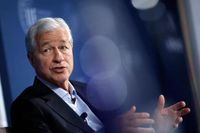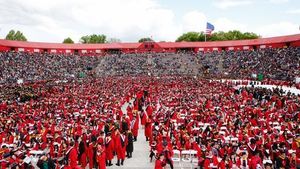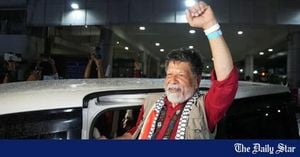JPMorgan Chase CEO Jamie Dimon sounded a clear note of caution on Tuesday, September 9, 2025, as fresh government data revealed the U.S. economy may not be as robust as previously believed. Dimon, speaking in a CNBC interview, pointed to the Bureau of Labor Statistics’ (BLS) latest benchmark payrolls revision as a sign that the economy is weakening, though he stopped short of predicting an outright recession. "I think the economy is weakening," Dimon said, as reported by CNBC. "Whether it's on the way to recession or just weakening, I don't know."
The BLS report, released the same day, delivered a jolt to economic watchers: it revised the nation’s employment growth figures for the 12 months through March 2025 downward by a staggering 911,000 jobs. According to Reuters and CNBC, this marks the largest downward adjustment in more than two decades. The Labor Department’s revised estimates of nonfarm payroll additions, spanning April 2024 to March 2025, painted a much less rosy picture of the labor market than earlier data had suggested. Dimon, referencing the new figures, told CNBC, "The report doesn’t capture the current state of the labor market, but the findings suggest that previously reported job growth was overstated, offering a more tempered view of recent employment trends."
These revisions come on the heels of already worrying monthly jobs data. July 2025 saw employment growth slow to a near halt, with only 73,000 jobs added, while August’s nonfarm payrolls increased by a mere 22,000, according to CNBC. The cumulative effect of these numbers is a portrait of an economy losing steam, even as Wall Street indices like the Invesco QQQ Trust (QQQ) and the SPDR S&P 500 ETF (SPY) eked out modest gains during midday trading on Tuesday.
Dimon’s remarks carry particular weight in financial circles. As the long-serving CEO and President of JPMorgan Chase—roles he has held since December 31, 2005—Dimon has guided the nation’s largest bank by assets through numerous economic cycles. He also serves as Chairman of the Board, a position he assumed a year after becoming CEO, and holds seats on several prestigious boards and councils, including the Business Roundtable and the Board of Trustees of New York University School of Medicine, as noted by Reuters.
During the CNBC interview, Dimon emphasized that JPMorgan’s vantage point gives it access to a sweeping array of data on consumer behavior, corporate activity, and global trade. "We are privy to a spectrum of data around consumers, corporations, and global trade," he said. This unique perspective allows Dimon to spot trends and risks that others might miss, though he has also been known to sound alarms that do not always materialize into immediate crises.
Despite the gloomy labor data, Dimon acknowledged that most consumers remain employed and continue to spend, though he added an important caveat: "Most consumers still have jobs and are spending money, depending on their income levels, but their confidence may have just taken a hit." He continued, "There’s a lot of different factors in the economy right now," citing the weakening consumer sentiment alongside still-strong corporate profits. "We just have to wait and see."
Indeed, the divergence between consumer and corporate conditions is striking. While household confidence appears to be wavering, corporate profits remain robust. This split, Dimon suggested, is one of several "different factors" currently shaping the economic landscape. Retail sentiment on JPMorgan itself reflected this uncertainty, dipping to "neutral" from "bullish" territory on September 8, 2025, with message volumes at "high" levels, according to Stocktwits.
Adding another layer of intrigue to the unfolding economic story, the Labor Department’s downward revision was unusually sharp. The 0.6% drop in total nonfarm employment for the period is the biggest of its kind in more than twenty years, a fact not lost on market watchers. According to CNBC, the scale of the revision surpassed even the high end of Wall Street’s expectations for a downward adjustment. The new data suggests that the world’s largest economy produced far fewer jobs than previously thought, casting doubt on the strength of the recent recovery.
The political backdrop has only heightened the drama. President Donald Trump, in a move that drew both criticism and support, fired the Bureau of Labor Statistics commissioner last month, just hours after the release of July’s disappointing jobs report, as reported by CNBC. The decision underscored the political sensitivity of economic data—especially as the country heads into an election year and economic anxiety simmers.
Looking ahead, many eyes are on the Federal Reserve. Dimon predicted that the Fed will "probably" cut its benchmark interest rate at its upcoming meeting later in September 2025, but he was quick to temper expectations about the impact of such a move. "The Federal Reserve will probably reduce its benchmark interest rate at its next meeting later this month, though that might not be consequential to the economy," Dimon told CNBC. He explained that with so many variables at play, a rate cut may not be enough to offset the broader forces weighing on growth.
Dimon’s own background lends credibility to his analysis. Before joining JPMorgan Chase, he held top executive roles at Bank One (where he was Chairman and CEO from 2000 to 2004), Citigroup, Travelers Group, Commercial Credit Company, and American Express. He is a Tufts University graduate with an MBA from Harvard Business School, and his extensive experience navigating financial crises and recoveries has made him a trusted—if sometimes cautious—voice in the industry, as detailed by Reuters.
With the economy at a crossroads, Dimon’s cautious tone reflects a broader sense of uncertainty. The combination of downward job revisions, slowing monthly employment gains, and wavering consumer confidence has left policymakers, investors, and ordinary Americans alike wondering what comes next. While some observers hope that strong corporate profits and a possible Fed rate cut will stave off deeper trouble, others fear that the labor market’s weakness could signal tougher times ahead.
For now, Dimon’s message is one of vigilance and patience. As he put it, "We just have to wait and see." With so many moving pieces in the economic puzzle, only time will tell whether the current slowdown is a temporary blip or the start of a more serious downturn.




